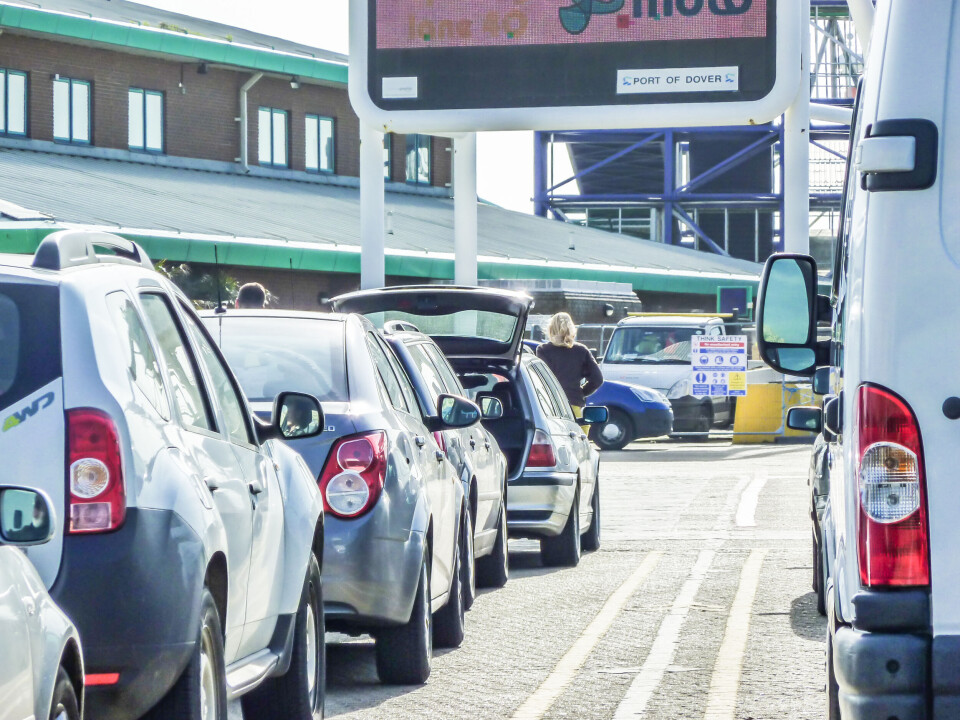-
Pistes closed, confinement orders: Alpine resorts deal with avalanche risk
Increased snowfall this weekend may cause further closures as busy school holiday season continues
-
Former French Interior Minister announces 2027 presidential candidacy
Bruno Retailleau recently asked prefectures to be tough on immigration
-
Ryanair axes Dublin-Rodez route but London connection retained
“We are disappointed but had no say in decision” say airport authorities
Explainer: How has Brexit changed UK passport checks at EU borders?
Passport checking requirements at EU borders have changed in the post-Brexit era

Passport checking requirements at EU borders in the post-Brexit era mean that often holidaymakers will face long queues to cross the Channel to Calais as they wait to get through border control. In the medium term, this could get worse due to new systems coming in 2023, but it is hoped things will be better long-term
Read more: Dover traffic backlog now cleared but warnings of future delays
Read more: Port of Dover queues: A one-off or a long-term problem?
Queues were the source of tension between the French and UK governments in summer 2022 as the UK criticised France's organisation ahead of the holiday rush.
This led France’s Transport Minister Clément Beaune to point out that "France is not responsible for Brexit."
MEP Guy Verhofstadt, who served as prime minister of Belgium from 1999 to 2008 and who was the European Parliament’s Brexit Coordinator and Chair of the Brexit Steering Group, also took the opportunity to highlight the problems surrounding Brexit, saying: “Before the Tory Brexit, cars were waved through, now everyone's passport has to be stamped.
“Truss or Sunak can't even admit it, let alone do anything about it. Blaming France for a hard border is just cynical.
“Taking back control was a big lie!”
Since the UK left the EU, British citizens have been subject to more detailed passport checks when travelling into the bloc, and at Dover it means that each car must stay at the border control booths for about half a minute longer.
When there are tens of thousands of people passing through the port each day, this can create congestion.
Here is how British passport checks have changed since Brexit...
What were the passport checks before Brexit?
Before the UK left the EU, British citizens had an automatic right to move freely within the bloc.
The UK was not in the Schengen zone, so there were still border checks, but, as per rules set out in the Schengen Borders Code, they were minimal.
Therefore, they would often be waved through passport control at Dover after officers looked quickly at their passports to check their identity.
What are the passport checks after Brexit?
Now, French border control staff are responsible for carrying out several different checks on passports.
When they are handed a passport, they should theoretically:
- Make sure that the person’s identity corresponds with the passport details
- Check that they have not been in the EU for more than 90 days in the past 180
- Check that their passport has at least three months’ validity left
- Make sure that the passport was issued less than 10 years before the date of entry into the EU
- Check the reason for travelling and where they will be staying: supporting documents can include a host's letter, hotel booking etc.
- Check that the person has sufficient funds to support themselves during their stay in the EU and means to return (eg. a return ticket)
- Check they are not an a database of people for whom a security alert has been issued and/or are not considered a threat
Border control officers may not always carry out all of these checks, but the process will nonetheless last longer than for an EU/EEA/Swiss national.
Coming in May 2023: The European Entry/Exit System (EES)
Travel companies and others are already warning of more delays being likely from spring 2023, due to the start of the EES.
The purpose of this new electronic database and checking system is better to keep track of the comings and goings of third country nationals who do not need visas and checking on overstaying under the 90/180 days rule, and also improved security.
In theory, in the long-term, it may speed up checks, especially if airports and ports etc. gear up to fully automate the checks, as is meant to be possible, though with a border guard at hand to supervise. It should also mean that eventually passport stamps will be unnecessary.
In the short-term, however, it will make things take longer as it necessitates taking each person's photo and fingerprints for a database. These will then be kept for five years. The person's identity and dates of entry and exit from the Schengen area will also be recorded into an electronic system, which will have both centralised and national elements to it.
An electronic system of information recording already exists for recording the entry and exit of people who need visas to come into the Schengen area called the VIS; the EES will be for all the rest.
Related articles
Can US and UK travellers use e-gates at French airports?
French authorities say technical issue led to Dover staff shortages
Driving scams, train ticket waiting list: Nine France travel updates
Six-hour queues at Dover: French police pledge to respond to criticism
























